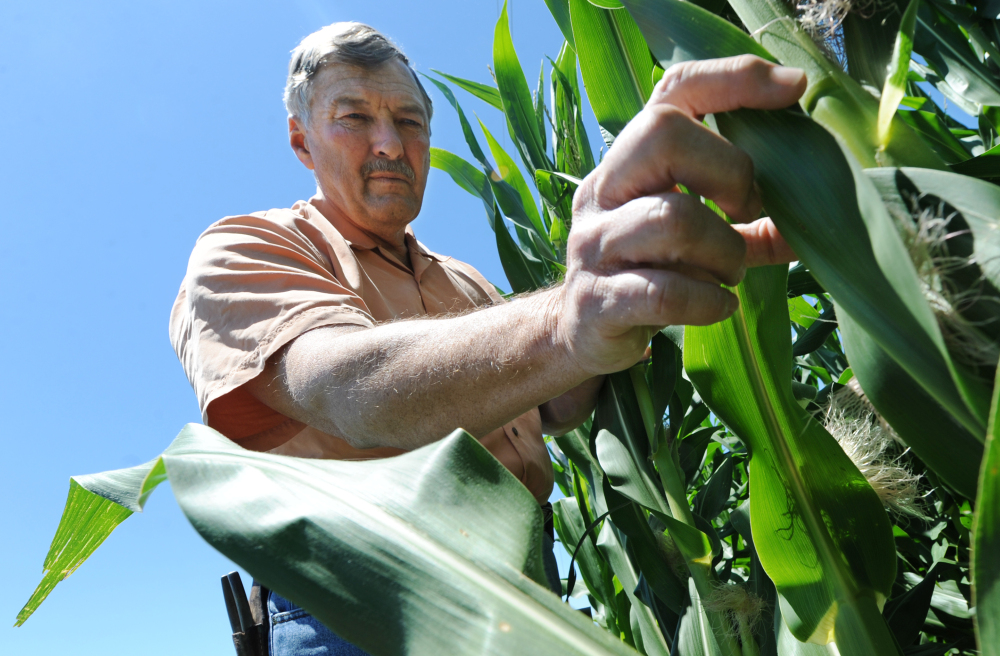JEFFERSON CITY, Mo. — In the nation’s agricultural heartland, farming is more than a multibillion-dollar industry that feeds the world. It could be on track to become a right, written into law alongside the freedom of speech and religion.
Some powerful agriculture interests want to declare farming a right at the state level as part of a wider campaign to fortify the agriculture industry against crusades by animal-welfare activists and opponents of genetically modified crops.
The emerging battle could have lasting repercussions for the nation’s food supply and for the millions of people worldwide who depend on U.S. agricultural exports. It’s also possible that the right-to-farm idea could sputter as a merely symbolic gesture that carries little practical effect.
“A couple of years from now, we might say this was the beginning of the trend,” said Rusty Rumley, a staff attorney at the National Agricultural Law Center in Fayetteville, Arkansas.
Animal advocates and other groups are increasingly urging consumers, grocers and restaurants to pay as much attention to how their food is raised as to how it tastes. Their goals include trying to curtail what they consider cruel methods of raising livestock and unsafe ways of growing food.
Those efforts are helping to fuel the right-to-farm movement in the Midwest, where the right has already won approval in North Dakota and Indiana. It goes next to Missouri voters in an Aug. 5 election. Similar measures passed both chambers of the Oklahoma Legislature earlier this year before dying in a conference committee. And they could soon spread elsewhere.
The uncertainty surrounding the proposals stems from the vague wording of the measures, yet to be tested in court.
Missouri’s proposed constitutional amendment asks voters whether the right “to engage in farming and ranching practices shall be forever guaranteed.”
Indiana’s new measure –which was written into state law but not enshrined in the constitution – protects the rights of farmers to use “generally accepted” practices, including “the use of ever-changing technology.” The North Dakota measure prohibits any law that “abridges the right of farmers and ranchers to employ agricultural technology, modern livestock production and ranching practices.”
Supporters hope the wording provides a legal shield against initiatives that would restrict particular farming methods, such as those modeled after a California law setting minimum cage space for hens or policies in Florida and Ohio that bar tight pens for pregnant pigs. Others hope to pre-empt any proposals to ban genetically modified crops similar to ones recently passed in southern Oregon.
“Agriculture’s had a lot folks that’s been trying to come down on our farms and tell us what we can and cannot do,” said Neal Bredehoeft, a corn and soybean farmer who supports the Missouri measure. He added: “This gives us a little bit of protection.”
Bredehoeft gave $100 to the political group backing Missouri’s ballot measure. His money is being mixed with five-figure checks from the state corn and pork associations, the Farm Bureau and businesses with strong financial stakes in rural America, such as electric cooperatives and a farm-credit organization.
They’re preparing for an advertising blitz against a coalition that includes the Humane Society of the United States and the Sierra Club that have battled for decades against large hog and poultry operations.
Opponents fear the right-to-farm measures could be cited by corporate farms to escape unwanted regulations against pollution and unsanitary conditions.
Send questions/comments to the editors.



Success. Please wait for the page to reload. If the page does not reload within 5 seconds, please refresh the page.
Enter your email and password to access comments.
Hi, to comment on stories you must . This profile is in addition to your subscription and website login.
Already have a commenting profile? .
Invalid username/password.
Please check your email to confirm and complete your registration.
Only subscribers are eligible to post comments. Please subscribe or login first for digital access. Here’s why.
Use the form below to reset your password. When you've submitted your account email, we will send an email with a reset code.